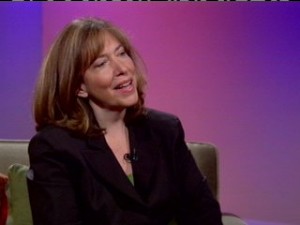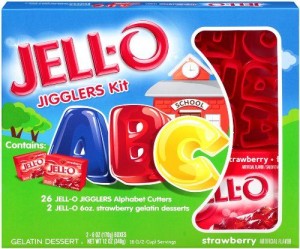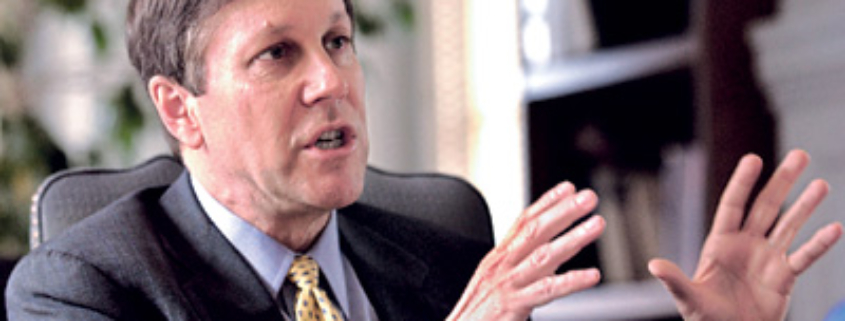A Poet Laureate, Jell-O, and Me
“The shift from a manufacturing to a knowledge economy has lasted two decades. Now the next shift is coming: from knowledge to creativity. We no longer need to hire knowledge. It’s nearly all at our digital fingertips.” – Kaihan Krippendorf, Fast Company
* * *
I didn’t set out to wear a business suit. “Part Time. Girl Friday. Spanish helpful but not necessary.” Those were the words that led me into a world I knew nothing about: advertising. US Hispanic advertising, to be precise.
It was 1980. I was fresh out of college with a BFA in theatre, determined to support myself with the kind of part-time job that allowed for auditions and wouldn’t crush my creative spirit. In addition to light bookkeeping and other administrative responsibilities, my Girl Friday tasks would include ghost writing new business materials for a larger-than-life Cuban with a torpedo cigar protruding from his mouth and a toupé perched on his head. Even Bewitched didn’t provide that bilingual bicultural perspective.
“Rahchel,” he bellowed, “I need for dictashun for jew una carta. Escribe.”
Not even Spanglish captured his ability to mangle, manipulate, and make up words. He dictated to me in a language all his own. After a few days, I tried to quit, explaining to his gringa wife that I couldn’t continue because I couldn’t understand him.
“Give it a little more time,” she said. “You might get used to it.”
It wasn’t long before I picked up on patterns. The suffix “ation,” for example, was often a substitute for “ing.” So if he said “grabation,” I realized he meant, “recording,” since the verb “grabar” means “to record.”
“Rahchel, jew need for go to the estudio para one grabation.”
My mental conversions happened faster and faster, and soon I was tackling sixty-page presentations with complex passages about the demographics and psychographics of the US Hispanic market. His wife was right. I got the hang of it and stayed–for fourteen years. Before you could say Telemundo, I became the first employee of what turned into Madison Avenue’s largest Hispanic ad agency.
“Rahchel, we gotta makashure que el cliente tiene el entendation que el Mercado Hispano es one sleeping gigante.”
It was soon my job to help prospective clients understand the untapped potential of this sleeping giant—8 million Latinos with billions of dollars in buying power. For perspective, the US Hispanic population now exceeds 52 million with buying power upwards of 1.5 trillion.
I costumed myself in a two-piece business suit, pantyhose, and heels and presented my prose to a captive audience—CMOs, CEOs, Corporate America. Presentations let me write and act, albeit in offices and conference rooms. If I played my role just right, I could win their trust and, ultimately, their business.
That’s when the conflict began. Winning business meant taking on more work. Part time became full time, and full time became all of the time. The pause button on my acting and writing careers got hit more and more often until the dream powered down all together. I promised myself I wouldn’t stay away from my creative pursuits for long. In the meantime, I collected a steady paycheck and was surrounded by some of the brightest minds in marketing and advertising. My clients included corporate giants like Procter and Gamble and General Foods (now Kraft).
* * *
In 2013, well into my third decade as an advertising executive, a career that included fifteen years of agency ownership, I had a now-or-never moment. Awakened by creative impulses, I pulled the trigger on the low-residency MFA program at Antioch University. As my first residency began, I spotted a familiar name on the list of guest artists: Dana Gioia (pronounced Joy-ah). If you’re not familiar with Mr. Gioia, and even if you are, his bio merits review. This past December, he was named Poet Laureate of California. Author of the controversial essay, “Can Poetry Matter?”, Gioia chaired the National Endowment for the Arts from 2003 to 2009 and is considered one of the most influential voices in poetry and arts advocacy. His 2007 Stanford Commencement address was listed by NPR as one of the greatest speeches of its kind. Gioia has two degrees from Stanford and one from Harvard and is oft quoted as saying he’s “the only person, in history, who went to business school to be a poet.” In the mid-’80s, he was a rising star in the high-stakes marketing world of General Foods, and that’s where our worlds intersected. Dana Gioia was my client. I only met Gioia, the poet, years later, in a classroom in Los Angeles, just as I was taking my own creative leap of faith.

Photo by Evan Vucci/AP WIDE WORLD PHOTOS
I attended Dana Gioia’s poetry workshop on The Poetic Line and listened to him read Gwendolyn Brooks’ poem, “We Real Cool” twice—once to accentuate the rhymes and once the way it was written. As he discussed strategies of syntax and stops, I could clearly see Gioia, the client, the man I knew more than two decades prior—the one who seemed different from other corporate executives even then.
When we had worked together, I was in my early twenties, he was in his thirties, and aside from a client crush sparked by his unchanged good looks and resonant voice, I was particularly enamored with his ability to simplify complex marketing ideas, communicating only what was essential. He was also one of the few clients who not only got the idea of culturally-specific marketing, but also seemed to embrace it. All too often, the average white male (or even female) marketing execs struggled with this new way of looking at the world. Nothing about Gioia was average. The son of a Mexican-American mother and an Italian-American father, Gioia was no stranger to cultural nuances, but there was more to his distinct style than that. He wasn’t as literal as many of his corporate MBA-trained colleagues, and he approached problem solving with an open mindedness and imagination that was more often associated with liberal arts types. At the time, I had no clue that he was a poet and neither did anyone else at General Foods or the Agency. Likewise, he didn’t know that I was an actress-writer in a costume, playing a role. There was a time when such things were better left unsaid.
…What we conceal
Is always more than what we dare confide….
From Unsaid, by Dana Gioia
One day in 1992, I was informed that Gioia had left General Foods. The news came as a surprise to everyone. He had turned the Jell-O brand around. We had even worked on Jell-O Jigglers together, a product innovation that helped grow sales. I heard something about his leaving to become a writer, but it wasn’t anything too specific. I remember thinking, That makes sense. He was sensitive and soulful in an industry where souls were sold, not protected.
 In his essay, “Being Outed,” Gioia writes about the Esquire article that stripped him of his literary anonymity. “When I entered corporate life, I resolved to keep my writing secret,” writes Gioia. “There was no advantage in being known as the company poet. For nearly a decade I succeeded in keeping my double life hidden from my co-workers.”
In his essay, “Being Outed,” Gioia writes about the Esquire article that stripped him of his literary anonymity. “When I entered corporate life, I resolved to keep my writing secret,” writes Gioia. “There was no advantage in being known as the company poet. For nearly a decade I succeeded in keeping my double life hidden from my co-workers.”
Shame. So did I.
* * *
Trends often swing like pendulums. What once was good for you is now bad for you until it’s good all over again. Think butter or bilingualism. Such is the case with creative artists in the corporate workplace. In the ’80s and ’90s, there was no room for polymaths or multi-hyphenates; renaissance types were not held in high regard. In business, you picked a lane and stayed in it. Being part of the advertising world meant you were all-in, 24/7. There might be time for hobbies—particularly sports or immersive drinking activities like happy hours—since those could be leveraged with clients and prospects. But wasting time with “frivolous pursuits” that were not likely to turn a profit? Unheard of. Words like flaky, irresponsible, and artsy-fartsy characterized anyone who invested in their artistic dreams.
Fast forward to the 21st century. Fast Company, one of the leading publications on business innovation, has written countless articles on the Creative Economy. Not only can Creatives come out of the closet, but, also, they can ask for a raise. In a Wharton School of Business interview in which Gioia discusses the “close connection between business and poetry,” he alludes to some of the obstacles that have kept creativity and commerce apart. “I don’t know any senior executive in the United States that doesn’t lament the need for greater creativity, conceptual innovation and imagination in their corporation,” says Gioia. “But they don’t know how to foster it …”
Over the course of my career, I have witnessed uninspired hiring and training practices filter creative thinkers out or scare them away if they slip through. Not taking corporate culture seriously turned out to be my key to success, but not everyone starts out as young and clueless as I did. I had no business background, but I grasped the concepts inherent in marketing and advertising analysis. Soon, I had a business card that introduced me as a Strategist, in spite of my desire for a title like Storyteller, Struggling Artist, or even Comic Relief. I never thought about these identities as part of a whole—more complementary than conflicting—but it turns out they are. A De Gruyter Open paper, “Poetry and the World of Business—An Exploration,” cites a study examining the relationship between poetry and strategic thinking. Researcher Clare Morgan identified at least nine ways in which poetry can help business. She revealed poetry’s role in dealing with ambiguity and uncertainty and in learning to make associative connections—all important business skills. Poems encourage us “to question givens and make us more aware of complexity.” Additionally, being that poems don’t “offer closure,” and are “infinitely interpretable,” they help us “handle non-resolution,” and consider the views of others.
In her book What Poetry Brings To Business, Morgan asked Gioia, the executive, about his “success in turning Jell-O from a business with a seven million dollar loss to a twenty million dollar success.” Gioia, the poet, responded: “I looked at things differently. I made associative connections. I thought around and beyond and through the data that confronted me.” In the business world, my mind worked well because my mind worked like a poet’s.
Gioia left General Foods about twenty-five years ago in order to dedicate his life to his art, and he never looked back.
Money is a kind of poetry.– Wallace Stevens
Money. You don’t know where it’s been,
but you put it where your mouth is.
And it talks.
From Money, by Dana Gioia
It has taken me a few decades to pick up where I left off after I put the arts on hold and took a left turn into advertising. I used to call those lost years procrastination. I now refer to them as a digression, if for no other reason than it’s much more literary. To that end, I am on “modernity leave,” from my suit-wearing, business-card carrying career. If there were ever a moment to be a poet or a writer or an artist of any kind in the business world, this would be it. As I experience my creative rebirth and nurture an inner child, I weigh the trade-offs of keeping a foot in each world and, every day, come closer and closer to cutting the cord.
Born on a small island near Puerto Rico called Manhattan, Rochelle credits her Lower East Side roots with her love of culture, humor and language. She lives in LA, has over three decades of U.S. Hispanic marketing experience, and is a recent Antioch MFA graduate. She holds a BFA in Theater from UC Irvine.






